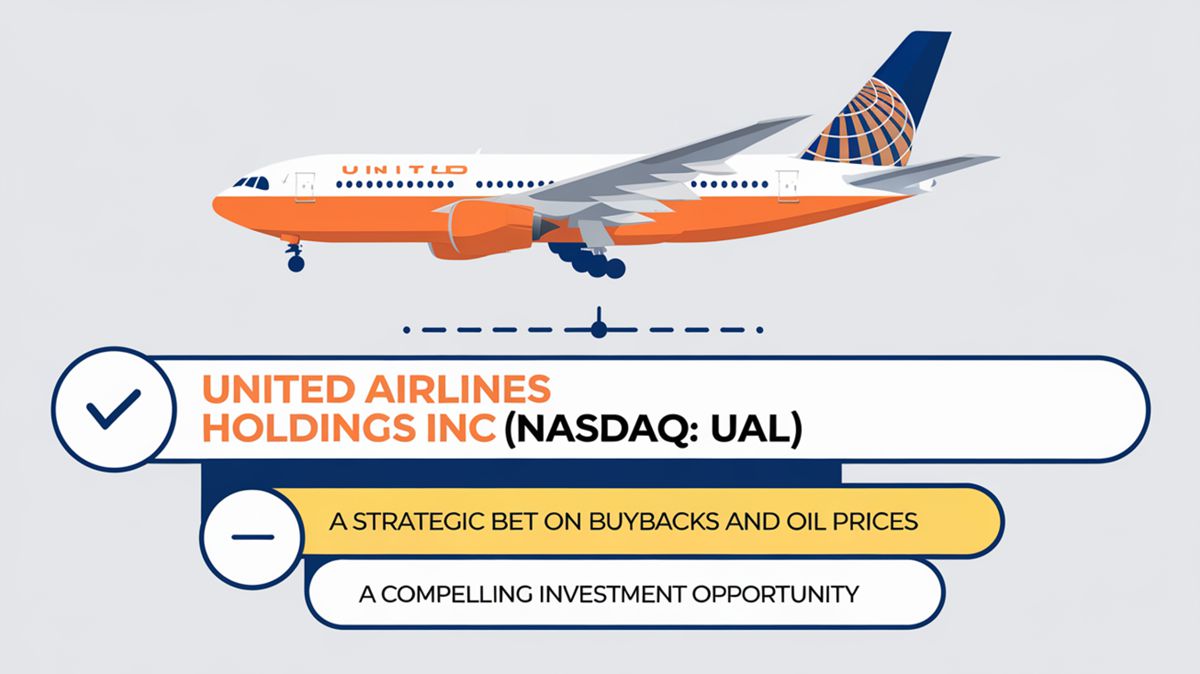United Airlines Primed for Double-Digit Upside Potential: A Strategic Bet on Buybacks and Oil Prices

The Buyback Boost: A Vote of Confidence
Stock buybacks are often seen as a strong indicator of a company’s belief in its undervaluation. By repurchasing shares, United Airlines is effectively reducing the number of shares outstanding, which can enhance earnings per share (EPS) and potentially drive up the stock price. This move comes at a time when United’s financial performance is robust, with third-quarter results exceeding expectations. The airline reported an adjusted EPS of $3.33, surpassing the anticipated range of $2.75 to $3.25, and a revenue of $14.84 billion, marking a 2.5% year-over-year increase.
The buyback program is United’s first since the onset of the COVID-19 pandemic, reflecting a return to financial stability and growth. Analysts have responded positively, with some projecting a price target as high as $100 per share, indicating a potential increase of over 28% from current levels. This optimism is further supported by United’s strategic initiatives, including capacity expansion and a focus on premium offerings, which are expected to attract high-spending travelers.
Oil Prices: A Double-Edged Sword
Oil prices play a critical role in the airline industry’s profitability, as fuel costs represent a significant portion of operating expenses. Currently, the global average jet fuel price is around $98.68 per barrel, a notable decrease from its peak in 2022. This decline provides some relief to airlines, allowing them to maintain or even expand profit margins. However, the situation remains fluid, with economic uncertainties and geopolitical tensions potentially impacting future oil price trends.
For United Airlines, lower oil prices translate into reduced fuel costs, which can bolster earnings. The company’s ability to manage these costs effectively, coupled with its strategic investments, positions it well to capitalize on favorable market conditions. Moreover, United’s proactive approach to fuel management, including hedging strategies and fleet modernization, further mitigates the risks associated with fluctuating oil prices.
Inflation Dynamics: Navigating the Challenges
Inflationary pressures are a reality in today’s economic landscape, affecting various sectors, including aviation. For airlines, rising costs can erode profit margins unless they are able to pass these costs onto consumers through higher fares. Interestingly, while U.S. airfares have increased by 1.6% compared to September 2023, they remain lower than pre-pandemic levels, indicating a complex inflationary environment.
United Airlines has demonstrated resilience in navigating these challenges, as evidenced by its strong financial performance and strategic initiatives. The rebound in corporate travel, driven by return-to-office policies, is a significant growth driver, contributing to increased demand and pricing power. Additionally, United’s focus on operational efficiency and cost management positions it well to weather inflationary pressures and sustain profitability.
Analyst Sentiment: A Strong Buy
The consensus among analysts is overwhelmingly positive, with a “Strong Buy” rating for United Airlines stock. The average 12-month price target is $83.93, suggesting a potential upside of 7.24% from the current share price of $78.26. Analysts project significant earnings growth, with an average EPS of $10.18 for 2024, up from the current EPS of $8.39. This growth trajectory is expected to outpace the US Airlines industry average, underscoring United’s competitive advantage.
Moreover, United’s strategic focus on expanding profits through premium offerings and capacity growth aligns with market trends, enhancing its appeal to investors. The company’s robust financial health, coupled with its strategic initiatives, supports the bullish sentiment and reinforces the case for a strong buy.
The Road Ahead: Opportunities and Challenges
While United Airlines is well-positioned for growth, it is not without challenges. Rising operating expenses, high debt levels, and labor pressures are potential headwinds that could impact future performance. However, the company’s proactive approach to addressing these challenges, including strategic investments and operational efficiencies, provides a solid foundation for sustained growth.
Looking ahead, United’s ability to capitalize on favorable market conditions, such as low oil prices and a rebound in corporate travel, will be crucial to its success. The airline’s strategic initiatives, including the $1.5 billion buyback program, reflect management’s confidence in its growth prospects and underscore its commitment to delivering value to shareholders.
Conclusion: A Compelling Investment Opportunity
In conclusion, United Airlines presents a compelling investment opportunity, driven by strong financial performance, strategic initiatives, and favorable market conditions. The recent buyback announcement is a testament to management’s confidence in the company’s future prospects and suggests a potential double-digit upside for investors. While challenges remain, United’s proactive approach to navigating these headwinds, coupled with its strategic focus on growth, positions it well for long-term success.
For investors seeking exposure to the airline industry, United Airlines offers a balanced mix of growth potential and financial stability. As the company continues to execute its strategic initiatives and capitalize on market opportunities, it remains a strong contender for your investment portfolio. Keep an eye on oil price trends and inflation dynamics, as these factors will play a crucial role in shaping United’s future performance.
Send us a Message
Contact us
Contact us today to learn more about Kavout's products or services.

